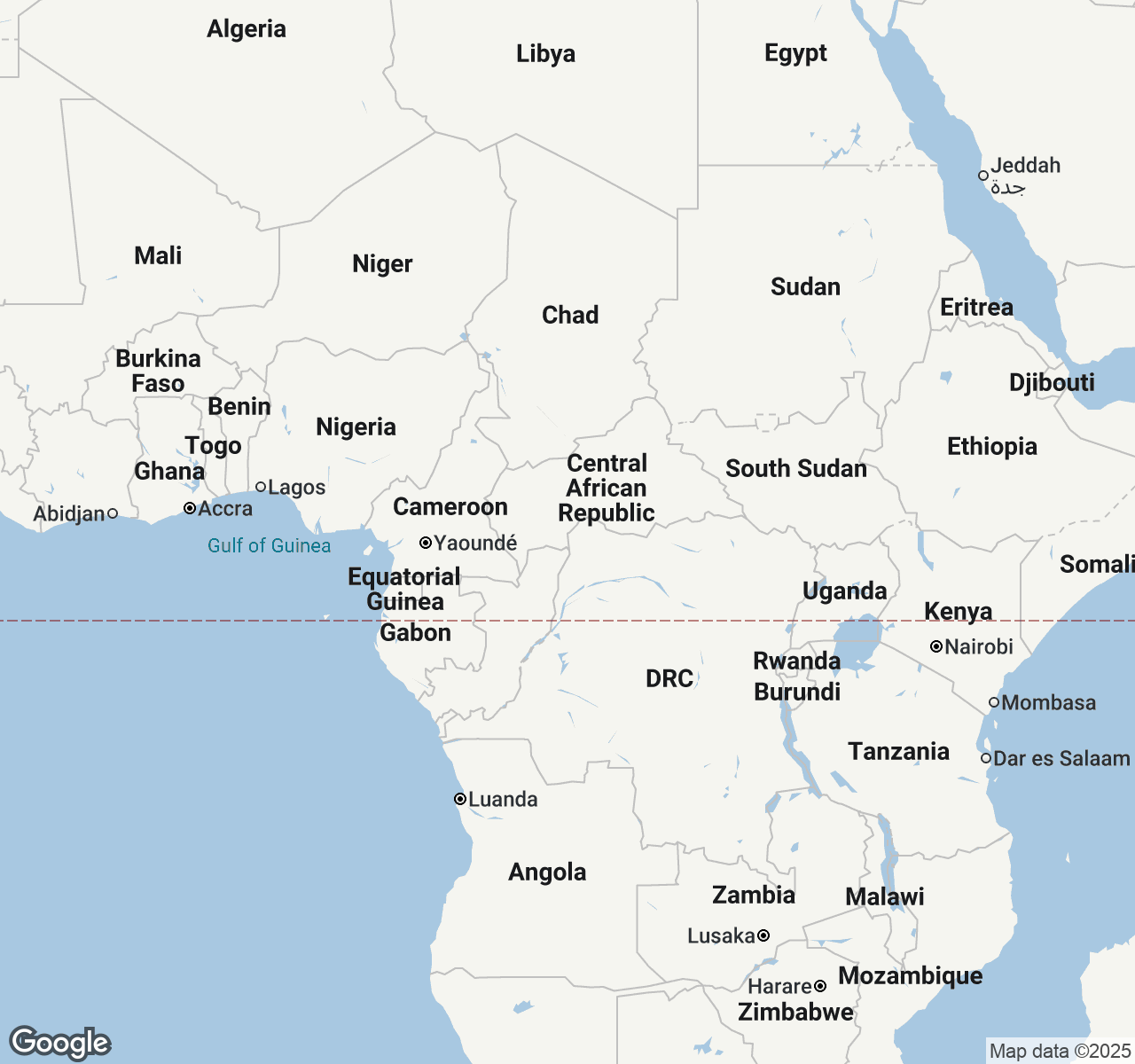
Things to Do in Bangui
Discover the best of Bangui
Plan Your Trip
Essential guides for timing and budgeting
Top Things to Do in Bangui
Discover the best activities and experiences. Book now with our trusted partners and enjoy hassle-free adventures.
Explore Bangui
Bambari
City
Bangui
City
Bangui Cathedral
City
Bangui Mpoko International Airport
City
Bangui Port
City
Berberati
City
Boali Falls
City
Boganda Museum
City
Bossangoa
City
Carnot
City
Central Market
City
Central Market Marche Central
City
Central Mosque Of Bangui
City
Chinko Nature Reserve
City
Dzanga Sangha National Park
City
Kilometre Cinq Km5 District
City
Km5 District
City
Lobaye Forest
City
Manovo Gounda St. Floris National Park
City
National Museum
City
Notre Dame Cathedral
City
Place De La Republique
City
Presidential Palace
City
Rock Hotel Area
City
Sangha River
City
Ubangi River
City
Ubangi River Waterfront
City
University Of Bangui
City
University Of Bangui Campus
City
Your Guide to Bangui
About Bangui
Bangui sits where the Ubangi River cuts through central Africa, a capital caught between French colonial history and modern African life. Wooden pirogues float past concrete buildings. Along the riverbanks, Sango voices mix with the slower pace of a city that refuses to rush. The markets are loud and crowded, packed with tropical produce and spices while vendors shout over the sound of drums in the distance. Daily life moves with the river—steady, unhurried, occasionally chaotic. The Central African Republic's capital won't win beauty contests, but it has something harder to fake: authenticity that hasn't been packaged for tourists. Sunsets over the Ubangi turn the sky orange and purple. Every evening, the same show. For travelers tired of polished destinations, Bangui delivers something different—a city that didn't smooth its rough edges because no one asked it to.
Travel Tips
Transportation: Local buses charge 100-200 CFA ($0.17-0.34) for city routes. Moto-taxis are everywhere at 500-1,000 CFA ($0.85-1.70) for short distances. Taxi-Be (shared taxis) cost 150-300 CFA ($0.26-0.51) per person. Private taxis run 2,000-5,000 CFA ($3.40-8.50) for longer trips across town. The Port of Bangui connects to Brazzaville via river transport at 15,000-25,000 CFA ($26-43) one way. Walking is common in the city center but avoid after dark. River crossings to Kinshasa cost 3,000-8,000 CFA ($5.10-13.60).
Money: Central African CFA franc (XAF) is the only currency. BICEC and UBA banks have ATMs but cash shortages are frequent. Cards work at Hotel Ledger and some upscale restaurants. Budget $25-45 daily. Tipping 500-1,000 CFA ($0.85-1.70) is appreciated. Mobile money through Orange Money is growing. Avoid street money changers completely. Bank rates are fixed by law. Small shops prefer exact change. Keep emergency cash reserves as ATM reliability varies significantly.
Cultural Respect: Greet with 'Bonjour' and handshakes during daytime. Remove hats when entering buildings. Dress modestly especially at religious sites. Photography requires permission for people and government buildings. French is the official language though Sango is widely spoken. Ramadan is observed by the Muslim population. Avoid discussing politics or recent conflicts. Gift-giving shows respect. Business meetings start with extended personal conversations before any work discussion.
Food Safety: Local restaurants like Chez Nana serve Central African specialties for 1,500-3,000 CFA ($2.55-5.10). Grilled fish at riverside spots costs 2,000-4,000 CFA ($3.40-6.80). Makara (groundnut stew) at local markets runs 800-1,500 CFA ($1.36-2.55). Bottled water is essential at 300-500 CFA ($0.51-0.85). Stick to well-cooked food and avoid raw vegetables. Cassava bread costs 100-200 CFA ($0.17-0.34). Palm wine is popular but check quality.
When to Visit
Bangui's tropical climate offers distinct seasons that dramatically affect travel experiences. The dry season (November-March) provides the most comfortable conditions, with temperatures ranging from 21-33°C (70-91°F) and minimal rainfall (less than 50mm monthly). December and January are peak months with hotel prices 30-40% higher, but roads are accessible and wildlife viewing optimal. The transitional months of April and October offer excellent value with 20% lower accommodation costs, temperatures around 24-35°C (75-95°F), and occasional refreshing showers. The wet season (May-September) brings heavy rains (150-200mm monthly), high humidity, and temperatures of 22-30°C (72-86°F). While this period offers 40-50% savings on lodging, transportation becomes challenging due to poor road conditions. Cultural ensoiasts should visit during Fête de l'Indépendance (August 13th) for lively celebrations. Adventure travelers seeking real feels might prefer the quieter wet season, while wildlife ensoiasts and those requiring reliable transportation should stick to the dry months. Business travelers should avoid the rainy season when infrastructure limitations become most apparent.

Bangui location map